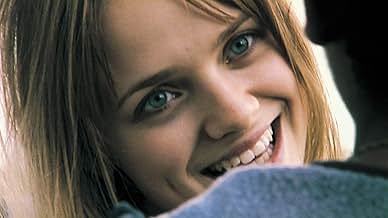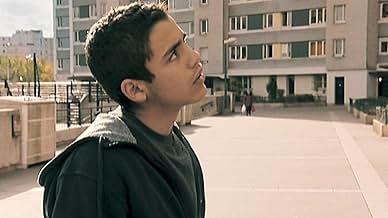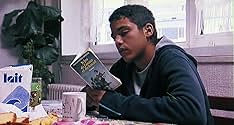PUNTUACIÓN EN IMDb
6,9/10
3,3 mil
TU PUNTUACIÓN
Krimo un chico tímido de 15 años se enamora de Lídia que es su compañera de clase, para poder asumir su amor por ella decide participar en la obra de teatro que iba a ser uno de sus amigos.Krimo un chico tímido de 15 años se enamora de Lídia que es su compañera de clase, para poder asumir su amor por ella decide participar en la obra de teatro que iba a ser uno de sus amigos.Krimo un chico tímido de 15 años se enamora de Lídia que es su compañera de clase, para poder asumir su amor por ella decide participar en la obra de teatro que iba a ser uno de sus amigos.
- Dirección
- Guión
- Reparto principal
- Premios
- 16 premios y 5 nominaciones en total
Meriem Serbah
- Krimo's Mother
- (as Meryem Serbah)
Reseñas destacadas
I saw L'Esquive at the San Francisco Film Festival on April 24. I was prepared for a sappy coming-of-age romantic movie but with the first dialogue which whisks you up before even the titles are shown and doesn't put you down until the end of the movie, I got something much more fulfilling. This is one realistic and well-performed movie. The director got some fantastic acting out of an almost 100% amateur cast. Very realistic and fast-paced. It is not a perfect movie, but it is very energetic and definitely a must-see.
Well worth seeing and probably the highlight for me at the festival. Hopefully it will screen in the US.
Well worth seeing and probably the highlight for me at the festival. Hopefully it will screen in the US.
This movie is getting fresh exposure in France thanks to its win at Les Césars, or the "French Oscars" as other countries like to call them. Its success will probably mean that it now gets exposure outside the country, too, and I wonder how successfully.
Though an accurate and contemporary examination of France, the film's world is a foreign one, even to many people living here--the specificity of the setting (the projects, in a "suburb" of Paris), the language (rapid-fire, slangy, "vulgar", and peppered with "verlan", a street language of inverted syllables--the word itself could translate as "wardsback", and how anyone will translate this dialogue I have no idea), and the behavior (mostly arguing--strident, pushy, beautifully repetitive) may not play clearly outside of France. I'm not sure how clearly it plays here, or how willing people are to watch it, especially as it turns the idea of the scary bad French projects somewhat on its ear.
This isn't a criticism of the movie; on the contrary. Kechiche has shot a riveting cross-section of teenagers growing up in social housing, in broken homes and poverty, who lack the tools of expression, and who have adopted the posturing of the wounded (and, in the story, almost entirely absent) adults who raise them, attacking (the movie unfolds at a near-constant level of verbal aggression) and dodging ("esquiver" means "to dodge" or "to evade") one another's attacks with all they can muster.
The film's intensely political side feels almost accidental; in its unfolding, it has great heart, and its actors, who are apparently mostly amateurs from around the shooting location, are outstanding. On the whole, it reminded me a great deal of David Gordon Green's George Washington: a simple love story set against a landscape of poverty, played out frankly and honestly, allowed to unfold at a distinctly un-Hollywoodian rhythm. If Green's film is more beautiful cinematic ally, L'Esquive is more concentrated, more unflinching in its examination of the deep repercussions and violence of economic, social, and familial hardship. Its statement that France is no longer a country of the French-of-French-ancestry, and that its refusal to accept its own transformation does not mean its lost generation accepts its loss, could not be more clearly nor more poignantly made.
Without spoiling or going into detail, there are things about the plot that are implausible, things that probably hurt the film overall, but watching this movie for plot is like watching Ocean's Eleven for social insight. This is a positive study of character in a bad situation, of a stratum of society rarely filmed and still more rarely treated as fairly as it is offered up here, beautifully and eloquently.
Though an accurate and contemporary examination of France, the film's world is a foreign one, even to many people living here--the specificity of the setting (the projects, in a "suburb" of Paris), the language (rapid-fire, slangy, "vulgar", and peppered with "verlan", a street language of inverted syllables--the word itself could translate as "wardsback", and how anyone will translate this dialogue I have no idea), and the behavior (mostly arguing--strident, pushy, beautifully repetitive) may not play clearly outside of France. I'm not sure how clearly it plays here, or how willing people are to watch it, especially as it turns the idea of the scary bad French projects somewhat on its ear.
This isn't a criticism of the movie; on the contrary. Kechiche has shot a riveting cross-section of teenagers growing up in social housing, in broken homes and poverty, who lack the tools of expression, and who have adopted the posturing of the wounded (and, in the story, almost entirely absent) adults who raise them, attacking (the movie unfolds at a near-constant level of verbal aggression) and dodging ("esquiver" means "to dodge" or "to evade") one another's attacks with all they can muster.
The film's intensely political side feels almost accidental; in its unfolding, it has great heart, and its actors, who are apparently mostly amateurs from around the shooting location, are outstanding. On the whole, it reminded me a great deal of David Gordon Green's George Washington: a simple love story set against a landscape of poverty, played out frankly and honestly, allowed to unfold at a distinctly un-Hollywoodian rhythm. If Green's film is more beautiful cinematic ally, L'Esquive is more concentrated, more unflinching in its examination of the deep repercussions and violence of economic, social, and familial hardship. Its statement that France is no longer a country of the French-of-French-ancestry, and that its refusal to accept its own transformation does not mean its lost generation accepts its loss, could not be more clearly nor more poignantly made.
Without spoiling or going into detail, there are things about the plot that are implausible, things that probably hurt the film overall, but watching this movie for plot is like watching Ocean's Eleven for social insight. This is a positive study of character in a bad situation, of a stratum of society rarely filmed and still more rarely treated as fairly as it is offered up here, beautifully and eloquently.
I really did like this film! - those viewers, French or otherwise, who have seen, and been able to follow the sound track of La Haine, will be quite at home in this environment, will know what to expect, and will be sensitive to the message the film conveys. True, it may lack the sort of 'excitement'that some film-goers may seek, but one has to take it for what it is: a hard-hitting social document which will resonate with many who are familiar with the inner-city tensions found in many French towns in recent years. The gambit of choosing amateur actors worked very well,in my opinion, a point which other viewers seem to echo.
This French film is a quite disheartening look at life in the public housing projects outside Paris. In a crumbling neighborhood with a majority of immigrants from Northern Africa, a high school tries to produce a play by Pierre Marivaux (1688-1763). The heart of the film is the budding romance between the vivacious blonde Lydia (one of the few "native" French living in the neighborhood) and the shy and painfully inarticulate Krimo, who is ridiculized by his thuggish friends for taking a part in the play. All the kids speak in an unintelligible slang, which makes a contrast with the classical French of Marivaux. I wrote it was disheartening (despite not being a drama) because it shows that the marginalized inhabitants of the projects have an almost nil chance of breaking into the mainstream of French society. Thoughtful and worth seeing.
I think this film deserve theirs Césars for a lot of reasons. The actors are excellent, especially Sara Forestier who's not from suburbs and has learned all words of this 'particular' vocabulary. The screenplay is very well, finally that's a play in a play ("le Jeu De l'Amour Et Du Hasard" written by Marivaux). This film shows almost the reality, is sometimes funny. The french teacher is disgusting, she is exactly what the director wants to fight : a society were there is no hope for an inhabitant of suburbs. As to her, Kremo is an idiot because he will never be Arlequin, he 'll never be in love and he doesn't even know how to play it. The film shows how wrong it is... The low point of the film is the sound, very bad, I think they wanted to be more realistic but that could be better, and realistic. This film is well to see, everyone can learn something.Even for french the language is hard to understand(sometimes we would have wanted subtitles!). I don't think the foreigners (particularly the ones who watch only blockbusters) will enjoy, or/and understand. But this freshly film is worth to be seen with attention.
¿Sabías que...?
- CuriosidadesThe movie is dedicated Slaheddine.
- ConexionesReferenced in Leçon de cinéma: Arnaud Desplechin et Mathieu Amalric (2019)
- Banda sonoraWarini Werak Tergoud
Performed by Cheba Zahouania
Written and Composed by Cheikha Rimitti
Production: MLP / History
Selecciones populares
Inicia sesión para calificar y añadir a tu lista para recibir recomendaciones personalizadas
- How long is Games of Love and Chance?Con tecnología de Alexa
Detalles
- Fecha de lanzamiento
- País de origen
- Idioma
- Títulos en diferentes países
- Games of Love and Chance
- Localizaciones del rodaje
- Saint-Denis, Seine-Saint-Denis, Francia(Cité des Francs-Moisins: housing complex, Rue du M.al Lyautey: police control)
- Empresas productoras
- Ver más compañías en los créditos en IMDbPro
Taquilla
- Recaudación en Estados Unidos y Canadá
- 8085 US$
- Fin de semana de estreno en EE. UU. y Canadá
- 2529 US$
- 4 sept 2005
- Recaudación en todo el mundo
- 1.747.263 US$
- Duración1 hora 57 minutos
- Color
- Mezcla de sonido
- Relación de aspecto
- 1.85 : 1
Contribuir a esta página
Sugerir un cambio o añadir el contenido que falta

Principal laguna de datos
By what name was La escurridiza, o cómo esquivar el amor (2003) officially released in India in English?
Responde






















